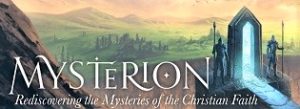 Mysterion, September 2025
Mysterion, September 2025
“The Last Sin-Eater of Harfolk County” by Grace F. Hopkins
Reviewed by David Wesley Hill
I always thought a sin-eater was the guy who, through connections and intimidation, made your problems go away—a fixer, like Liev Schreiber in Ray Donovan. I didn’t know literal sin-eaters existed until I read “The Last Sin-Eater of Harfolk County” by Grace F. Hopkins, the September offering of Mysterion, and was inspired by the story to do some Googling. Apparently, sin-eating as a real spiritual profession originated in Wales in the 17th century and was carried from there by Welsh migrants to America. Far from being smooth operators like Schreiber, however, sin-eaters were pariahs, impoverished and paid only a pittance for their services, which traditionally consisted of eating a plain meal of bread and ale from atop the casket or shroud of the dearly departed. Supposedly, in doing so, the sin-eater actually ingested the sins of the deceased, allowing them to move on into the afterlife without the burden of their earthly misdeeds. Then, as is customary with scapegoats, the sin-eater was exiled from polite society—until, of course, their specialized skill set was needed again. Considering the unique kind of desperation required to attract a person to such a poorly-paid and unappreciated career, it’s understandable that the last historical sin-eater in Wales died in 1907, and the profession is supposedly defunct in Appalachia, too.
Such is the factual background of “The Last Sin-Eater of Harfolk County,” where the dearth of sin-eaters has led to unfortunate circumstances, since all the un-eaten sin has accumulated in the ground and polluted the land, giving rise to monsters. By the time Credence “Creed” Carrigan is sixteen, his home of Harfolk County is a dangerous place, particularly after dark. The situation gets worse as the years go by, and when Creed is forty, “Harfolk County was a shell of what it had been. Nothing more than a few dozen inhabitants still clinging to a rotting husk.” Then, he and his mentor, Theobold Roth, come up with a plan to fight back against the things defiling their titular home county in an atmospheric novelette-length exploration of a little-known—at least, to me—folk tradition. Some genuinely creepy moments, and Lovecraftian overtones. An interesting read.